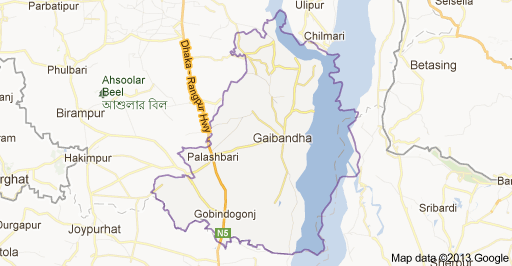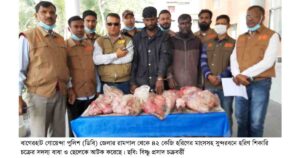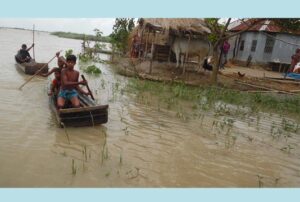Thousands hectares of char land lying on the river bed of the Brahmaputra and Teesta have been brought under different crops and vegetables cultivation during the current Robi season with an expectation of desired production.
According to sources hundreds of river eroded people living on the river basin and the chars started different crops and vegetables cultivation on the both sides of the rivers this year just after removing flood water from the river beds.Earlier, the growers were motivated by the field level agriculture officers to cultivate different varieties on the unused char lands to help them change their socio-economic condition and to achieve food security, said Saddam Hossain, a social worker. As the land on the river bed is very fertile, there is no necessary to use chemical fertilizers on the crop field to grow the varieties successfully and to get desired output against the produces. That’s why; the growers used nominal organic fertilizers and invested a little amount of money for it, said Mokbul Hossain, sub assistant agriculture officer of Kamarjani Union of Sadar Upazila. Now, the cultivated crops like Ganzia paddy, maize, mustard and ground nut and the vegetables on the river beds have grown well and they have taken greenish look. The harvest of some of the vegetables like brinjal, bean, cucumber, cabbage, cauliflower, chili, balsam apple, parble and gourd has already started and the growers are earning money by selling those in the local markets at fair prices, said M. Delwar Hossain, a dweller of char Khatiamari under Kamarjani Union of Sadar Upazila. Saiduzzaman, chairman of Mollarchar under Sadar Upazila, said if all the vast tracts of land were brought under crops cultivation by using modern agro technologies, the food production of the country would increase significantly and the poverty of the char dwellers and river basin people would be removed. District Training Officer of Department of Agriculture Extension (DAE) M. Aminul Islam said many non-government organizations including Practical Action Bangladesh side by side with upazila agriculture offices stood beside the char dwellers and helped them produce pumpkin on the char land under the technology of sand bar cropping. Talking to the BSS deputy director of DAE Mir Abdur Razzak said the chars and river basin people were being motivated so that they could bring the unused vast tracts of river beds under different crops and vegetables farming to help them make self-dependent economically. -BSS, Gaibandha




